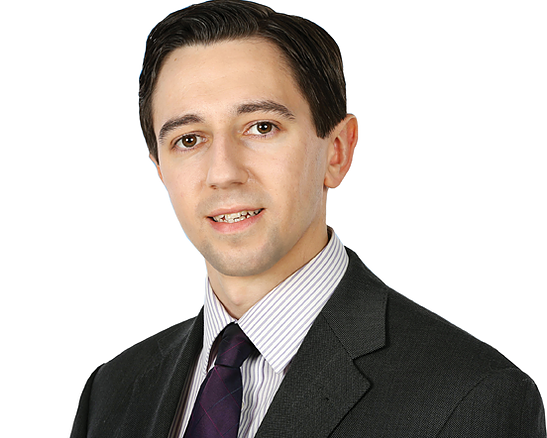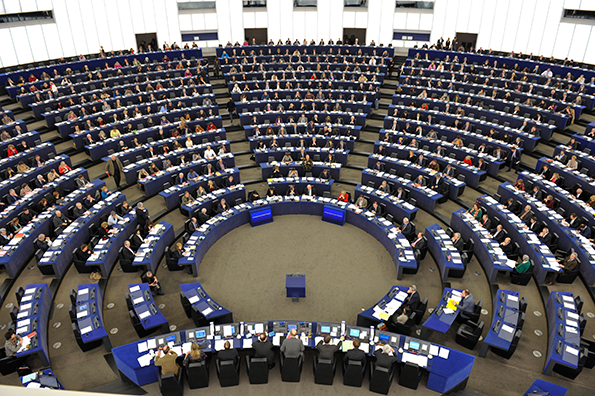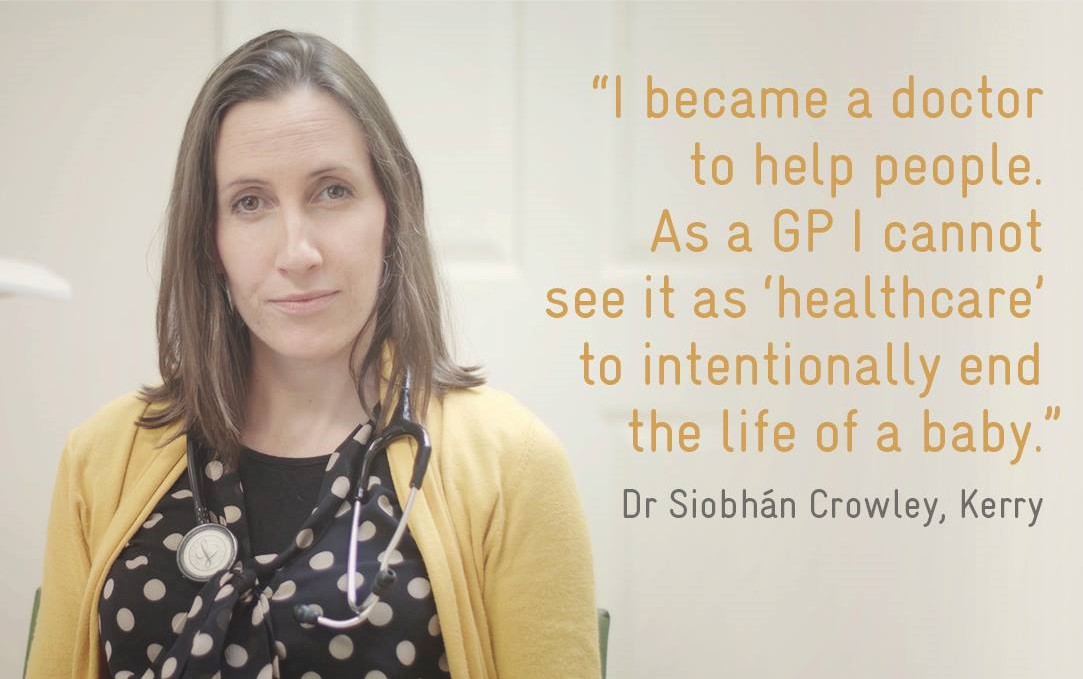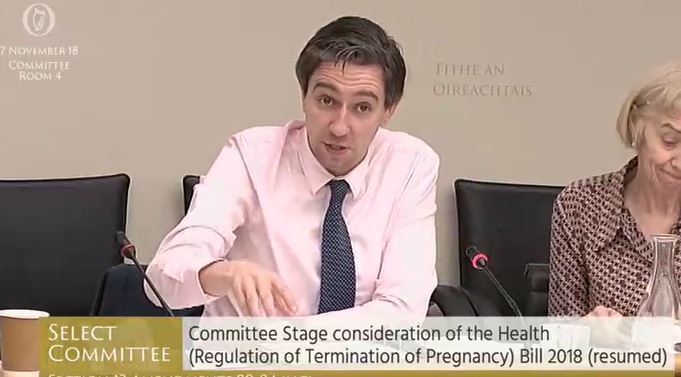
Legislation to provide for an extensive abortion regime for the first time in Ireland was passed by the Dáil following an extended debate.
The so-called Regulation of Termination of Pregnancy Bill was approved by 90 votes to 15 with 12 abstentions. The Bill will now go before the Seanad as the Government rushes to have it enacted in time for its planned introduction date in January.
A total of 65 amendments were tabled but only changes brought by the Minister for Health, Simon Harris, were passed. Fianna Fail refused to back any pro-life amendments.

Both Leo Varadkar and Simon Harris faced questions on what was described by People Before Profit TD Bríd Smith as a “cold war” between the Department of Health and the boards of the National Maternity Hospital and the St Vincent’s Healthcare Group over the planned hospital’s ethos and ownership. The plan to relocate the National Maternity Hospital at Holles Street in Dublin to the grounds of St Vincent’s hospital has been in the offing for the past 18 months but negotiations are still ongoing with the Minister for Health recently insisting that the board of directors should have an extra director to represent the public interest.
Mr Harris rejected claims by an anonymous hospital source that he was “meddling” in the issue and said the publicr should be concerned that the hospital has “robust governance” and that the State should have a seat at the table when the board was making decisions.
The Minister said the charitable status of St Vincent’s hospital also had to be sorted since “the nuns have said they are leaving” as well as public ownership.

Members of the European Parliament have expressed concern about proposed legislation in Bulgaria to control the operation of religious groups. On November 27, the MEPs said the proposed law “has the potential to significantly interfere with religious freedom in Bulgaria”.
The bill in question would significantly restrain the rights of minority faith groups, hampering theological schools, clergy training, missionary activity, free worship outside of designated buildings, and international funding of local ministries. A subsequent change to the bill raised the minimum membership requirement for registration of religious groups from 300 to 3,000 with the threat that denominations with fewer members could be shut down altogether.
The Alliance Defending Freedom (ADF) has also raised its voice against the proposed law.

A referendum to reduce the waiting period for divorce is to be held next year on the same day as the local and European elections on May 24th, the Government has decided.
At present, the Constitution only permits divorce where the spouses have lived apart for four of the previous five years. Now the Government proposes to either reduce the four year requirement to two or take it out of the constitution altogether.
A Government spokesman said on Tuesday that the question of which option would be decided over the coming weeks. It is intended to begin discussions with the other political parties and independents immediately.

A judge has described a Co Clare woman’s atheist marriage as “mumbo jumbo” and “for the fairies” stating that she didn’t get married at all four years ago because it did not fulfill the legal requirements.
He was responding to a woman accused of giving a Garda a false name. The woman said she used her new husband’s surname after they married at a humanist ceremony four years ago.
However, Judge Durcan said: “The law provides procedures for entering into marriage which is something that imposes civil responsibility and imposes civil obligations. That is what marriage is and your client wasn’t married four years ago.” He added: “Let us go by legal principles here – her maiden name is Haskett, her first husband was McLeish – her only husband.”
The solicitor representing the woman said her client had instructed her that she was married in an atheist or ‘humanist’ ceremony four years ago. Judge Durcan, however, told the solicitor that the defendant “instructs you to come in here with this cock and bull story about being married, that is daft and for the fairies”.
He added: “Your client has been living in an unreal world.”

A Dutch court has rejected an attempt by a 69 year old man to reduce his age by 20 years to align with the age he feels he is rather than his birth-age. The man wanted to make the change to enhance his prospects in life and love. In an unprecedented case, the Arnhem District Court told “positivity guru” Emile Ratelband it will not adhere to his request to shift his birth date two decades later to 11 March 1969.
“Mr Ratelband is at liberty to feel 20 years younger than his real age and to act accordingly,” the judges said.
“But amending his date of birth would cause 20 years of records to vanish from the register of births, deaths, marriages and registered partnerships,” adding that “this would have a variety of undesirable legal and societal implications”.

The Department of Health has ordered the Health Service Executive to ensure abortion will be available in all 19 maternity units from January 1st. The move comes amid rising uncertainty over whether the Government will meet its deadline for the introduction of abortion. Independent TD Peadar Toibin said recently that several maternity units around the country are resisting performing abortions.
The Department has also asked the 19 units to provide updates on how they plan to provide for abortion from the New Year onwards. Doctors in a number of hospitals have already expressed their opposition to the Government’s abortion plans due to conscience-objections and fears of a lack of resources.
Meanwhile, the World Health Organisation (WHO) will provide a week of educational sessions on ‘ethical issues’ in Dublin, Cork, Galway and Limerick. They have been invited by the Irish College of General Practitioners and the Institute of Obstetricians and Gynaecologists with funding from the HSE. Sessions are due to start on December 10th and will be made available to all staff who will be providing abortion from January 1st, across community and hospital settings.

Revised ethical guidelines for doctors executing abortions will not be ready in time for the launch of Simon Harris’ abortion regime in January.
President of the Medical Council, Dr Rita Doyle, told a closed meeting of GPs believes it is better to get the guidelines right rather than to rush them in time for the Government’s deadline for the introduction of abortion on January 1st. This means existing guidelines, including the provisions on conscientious objection, will apply to the service until they are updated.
Nonetheless, the consultant appointed by the Government to oversee the introduction of the service has said abortion will be available “in some form” in all of the State’s 19 maternity units from January. However, Dr Peter Boylan warned that “inevitably, there will be problems and nobody should expect perfection” at the start.
Meanwhile, the State has granted the first ever approval for the use of an abortion drug. The Health Products Regulatory Authority (HPRA) confirmed to the Irish Examiner last night that it has “received and approved Mifepristone for termination of pregnancy”. The tablet was authorised on November 30. The Nordic Group BV, with an address in the Netherlands, is listed by the HPRA as the marketing authorisation holder.

Dozens of GPs walked out of an Extraordinary General Meeting of the Irish College of General Practitioners yesterday in protest at the failure of the College to campaign for their right not to facilitate abortion.
Following the walk out, the group said “several hundred GPs have totally lost confidence in the ICGP board” and that “a serious crisis now exists that the Government cannot ignore regarding the rollout of GP-led abortion services.”
Spokesperson for the group, Dr Kirsten Fuller said: “ordinary GPs in their hundreds have done everything humanly possible in the past five months to get the ICGP board to listen to our concerns but we have been stonewalled every step of the way.”
She added: “Under the new law, doctors will be forced to facilitate abortions taking place. That’s entirely different to the present situation and Simon Harris knows it. The only way to resolve the current impasse is for the Government and the ICGP board to stop pretending there isn’t a crisis and start engaging with GPs in a respectful and open way.”
She added: “The first GPs heard that abortion services would be GP-led was when Simon Harris announced it on radio. From that day to this, GPs have never been consulted on the matter but from January 1, Minister Harris will impose abortion services on General Practice. GPs will face the full rigours of the law from the New Year if they conscientiously object to being involved in abortions.”
Under the proposed law, doctors will not have to perform abortions or prescribe the abortion pill, but they will have to refer women to doctors who will do so. Protesting GPs say this facilitates abortion and therefore the killing of one of their patients, namely the unborn child.

Private firms are to be used to provide scans for pregnant women wanting abortions, due to long waiting lists in the public health system.
The Health Service Executive (HSE) has asked private operators to tender for the provision of all forms of ultrasound at 12 sites across the country. The ultrasounds will be offered at primary care centres including GP practices, local hospitals and “private locations”.
Under the planned abortion service, GPs would refer a woman for a scan if it was deemed clinically necessary. This would occur if the pregnancy needed to be accurately dated as abortions via a GP-administered abortion pill can only take place within the first nine weeks gestation. After that, dangerous complications could arise.
The Irish College of GPs (ICGP) has said there is “genuine worry” promised rapid access to ultrasounds will not be delivered. Current delays in accessing scans generally are illustrated in the HSE tender documents, which reveal waiting list figures for several areas. In Waterford, 3,000 patients are waiting for an ultrasound and in South Tipperary the list has 1,000 patients on it, while in Letterkenny 400 patients are waiting.
Even though patients are seen more quickly in urgent situations, the existence of such lengthy lists is not viewed as compatible with the need to be able to refer women in crisis pregnancies quickly for ultrasounds.